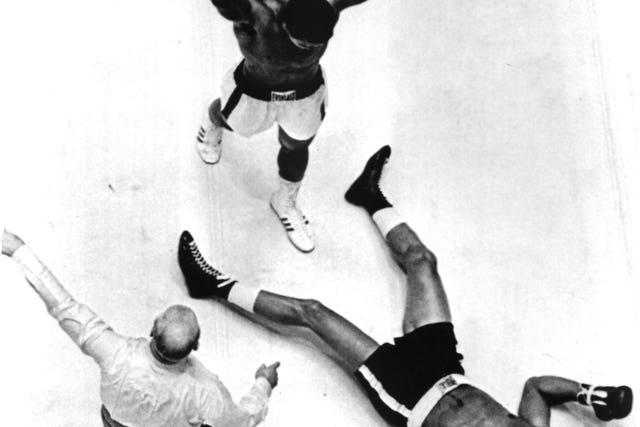
The top 10 fights of Muhammad Ali's heavyweight boxing career, ranked

Muhammad Ali, one of boxing's all-time greats and one of most popular athletes in the history of sport, has died at the age of 74. Fox Sports looks back at the 10 greatest bouts of Ali's legendary career.
10. Muhammad Ali (27-0) d. Ernie Terrell (39-4), The Astrodome; February 6, 1967
A full two years after Cassius Clay changed his name to Muhammad Ali, Terrell made a point of tauntingly calling Ali by his Christian name. After peppering Terrell with jobs and combos for seven rounds, Ali could be heard shouting "What's my name?" at Terrell from the eighth round onward. Some said the fight could have been stopped. Some said Ali was stringing Terrell along. Whatever it was, Ali proved it was best to leave the pre-bout taunting to him.

(Ron Galella/WireImage)
9. Muhammad Ali (55-3) d. Leon Spinks (7-0-1), New Orleans; September 15, 1978
After beating Frazier to regain his title in 1975, Ali fought a mix of top fighters (Ken Norton) and tomato cans (take your pick). Leon Spinks was somewhere in between until he beat Ali in a split decision in early 1978. Despite Norton being next up for Spinks, he opted for a more lucrative rematch with Ali instead. The fight itself was entirely forgettable but the result wasn't: Ali won a unanimous decision to win the title for a third time, a record until the alphabet soup of boxing eventually led to Evander Holyfield (who Atlanta Olympic organizer Billy Payne originally wanted to light the Olympic cauldron in 1996) getting it four times.

(Herb Scharfman/Sports Imagery/Getty Images)
8. Ali-Frazier II - Muhammad Ali (43-2) d. Joe Frazier (30-1), Madison Square Garden; January 28, 1974
Fights I and III were 15-rounders. For the sake of both fighters, thank goodness the middle match, which Ali won via unanimous decision, was a 12-rounder. It wasn't a bad fight by any means, but compared to the bookends of the rivalry, it's mostly forgettable thanks, in part, to George Foreman's knockout of Frazier ("Down goes Frazier!") months before, turning this into a non-title bout. Perhaps the best fight stemming from Ali-Frazier II was a pre-match, on-set rumble while the two were doing an interview with Horward Cosell.

(Hulton Archive/Getty Images)
7. Muhammad Ali (20-0) d. Sonny Liston (35-2), Lewiston, Maine; May 25, 1965
The Phantom Punch. In their rematch of the previous year's upset (by Clay), Liston was still favored (13/5) but the bout, held in a tiny auditorium in Lewiston, lasted about 90 seconds as the former champ crumpled with a quick right from his opponent. Was the fix in? That was the immediate belief because it made far more sense than the once-invincible Liston going down with such a quick punch. Rumors have flown for years but nothing has ever been proved and the majority of ringside observers seem to think the punch was true. The fight is best known for the stunning photo of Ali standing over a fallen Liston, taunting him to get up. It was taken by Neil Leifer of Sports Illustrated and is considered to be the greatest sports photo in history. But not only was the shot not on the cover of that week's SI, it didn't appear in the issue at all.

(The Ring Magazine/Getty Images)
6. Muhammad Ali (26-0) vs. Cleveland Williams (47-2), The Astrodome; November 14, 1966
In his seventh title defense and his first fight in America after his infamous quotes about "the Viet Cong," Ali brutalized the hard-hitting veteran with a handful of knockdowns, including one that ended the bout at 1:08 in the third. If you don't know the fight, you've seen the picture: The overhead shot of Williams sprawled on the canvas as Ali celebrates. (This is another angle.) All those brutal Mike Tyson knockdowns you've seen on ESPN2? Ali over Williams was like that, except the beatdown was as much beautiful science as sheer power.

(FPG/Getty Images)
5. (1960 gold-medal match) Cassius Clay (USA) vs. Zbigniew Pietzykowski (POL), Rome, 1960
The bout that started it all. An 18-year-old Clay won an easy gold-medal match against the veteran Polish fighter. Clay cherished his gold medal so much that he wouldn't take it off for days. But his excitement and love for his country (at the Games, Clay told off a Soviet reporter who tried to goad Ali into talking about the racial animus in America) soon turned after Clay realized that even becoming a national hero didn't make him immune to the ugly segregation of the era. What happened to his gold medal? Ali claimed he threw it in the Ohio River. ("The medal was gone, but I felt calmly relaxed, confident," he wrote. "My holiday as a White Hope was over.") Others said it was an apocryphal tale (including Bob Costas, who used that word to describe the story during NBC's coverage of the '96 Games when Ali received a duplicate medal). Regardless, the segregation was no invention and whatever happened to the medal, the story of its river dive was an important one in the history of Muhammad Ali's emergence as a civil rights leader.

(The Ring Magazine/Getty Images)
4. Cassius Clay (19-0) d. Sonny Liston (35-1), Miami Beach, Florida; February 25, 1965
At the tender age of 22, the 19-0 Clay earned his first title shot against the fierce, dominant champion Sonny Liston. At the time, Liston wasn't just the better fighter but the more popular figure, despite his multiple arrests and long history with the law. Clay was seen as too showy, already known as the Louisville Lip long before he became famous for his rhymes. (The poem he wrote before this fight might have been his best work.) "His public utterances have all the modesty of a German ultimatum to Poland but his public performances run more to Mussolini's Navy," Jim Murray wrote in the Los Angeles Times. The odds were 7/1 against Clay. Robert Lipsyte of The New York Times was told by editors to learn a route to the hospital, so he could get there easily after Clay was sure to be sent there by Liston. Things didn't go as planned. Despite Clay's corner accusing Liston of putting a blinding agent on his gloves, Clay roundly whupped the champ, who didn't answer the bell in the seventh and became the first heavyweight champion since 1919 to lose his belt while sitting on a stool. "I'm king of the world," Ali shouted at reporters after the knockout.

(Dieter LUDWIG/Gamma-Rapho via Getty Images)
3. Thrilla in Manila (Ali-Frazier III)- Muhammad Ali (43-2) d. Joe Frazier (32-2), Manila, Phillipines, October 1, 1975
"What you saw," Muhammad Ali said in the hours after his third, and final brawl with Joe Frazier, "was next to death." After 14 brutal rounds, trainer Eddie Futch refused to allow Frazier to come out for the 15th, a move Frazier only half-heartedly protested. Both fighters were bloodied, swollen and raw afterward. It's been said neither was ever the same. Their friendship, which had mostly disintegrated in the preceding years, wasn't either: Ali repeatedly called Frazier a "gorilla" and "Uncle Tom" in the lead-up to the fight, which Ali would say was just for show yet was something Frazier never truly forgave. At the end of the bout, however, Ali offered rare praise, with his own flair, of course. "[Frazier] is the greatest fighter of all time, next to me."

(The Ring Magazine/Getty Images)
2. Rumble in the Jungle - Muhammad Ali (44-2) d. George Foreman (40-0), Kinshasa, Zaire; October 30, 1974
"Ali bomaye!" The chant had echoed through Zaire for weeks in anticipation of the first, and only, fight between Ali and George Foreman, the powerful 25-year-old who took down Joe Frazier and had a stranglehold on the heavyweight division. Ali was a 3/1 underdog and given little chance to win. He was 32. He was a year-and-a-half past a loss to a lightly regarded Ken Norton. Muhammad Ali was washed up - at least that was the narrative.

(The Ring Magazine/Getty Images)
It wasn't exactly unfair, at least in reference to the Foreman bout. Ali didn't have the power to hold up against Foreman, who seemed indestructible - a real-life Ivan Drago. Everyone knew it, especially Ali. That's why, early in the fight, he started employing a tactic he'd first dreamt up in his training camp at Deer Lake and remembered while spying on Foreman in Zaire. With Foreman going on the attack, Ali hunkered down in defense. And thus was born the Rope-A-Dope - a strategy designed to absorb blows from Foreman while hanging on the ropes, all in the hopes of tiring out his opponent. It worked. Late in the eighth round, Ali threw a powerful five-punch combo at the champ, who fell headfirst onto the canvas and was counted out. Ali had become the second man to ever regain the heavyweight crown.

(John D. Kisch/Separate Cinema Archive/Getty Images)
1. Ali-Frazier I - Joe Frazier (27-0) d. Muhammad Ali (31-0), Madison Square Garden; March 8, 1971
For the past 100 years, the "[blank] of the century" has been the lazy writer's crutch of describing a monumental event. There have been a countless "trials of the century," dozens of "games of the century," and even more "fights of the century." In the latter category, however, there can be only one: Ali-Frazier I. Muhammad Ali hadn't fought a big bout in three years, the result of his suspension after a conviction for draft evasion. He'd had his titles stripped and Joe Frazier, a brawler from Philly, quickly made them his own. Both had a claim to the belts. On March 8, 1971, the top. Ali entered 31-0, Frazier at 27-0. It was the first time two undefeated heavyweight champions would face off.

(Robert Riger/Getty Images)
The hype was unprecedented. Frank Sinatra was ringside taking pictures for Life magazine. Oscar-winner Burt Lancaster (you might remember his as Moonlight Graham in Field of Dreams) provided color commentary. The crowd at Madison Square Garden was as star-studded as a Hollywood red carpet. America had waited years for the fight and Ali and Frazier didn't disappoint.
Time and inaction had robbed Ali of his speed, both with his hands and his feet. To compensate, he became the fighter many thought he could never be (Ali was far too pretty to get into a slugfest). Mostly through grit and courage, Ali made it all 15 rounds, despite getting knocked down for the first time in eight years. Frazier would win a unanimous decision and Sports Illustrated declared it "the end of the Ali Legend." So why is our top-10 list of Ali fights led by one he lost? Because it showed the character of a champion and was the catalyst for the second-round of greatness that was about to begin.

(Robert Riger/Getty Images)
